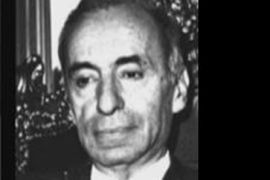Founding an Arab brotherhood
Michel Aflaq co-founded the Baath party as a means to unite the Arabs.

 |
| Aflaq, right, and Salah al-Din al-Bitter, with whom he founded the Baath party |
Michel Aflaq is regarded as one of the pioneers and intellectual forefathers of the Arab nationalist movement.
Considered the Christian ‘father of pan-Arabism’ by some Arab historians, Aflaq was born in Ottoman-occupied Syria in 1910.
The son of a middle class Greek Orthodox family, Aflaq studied in Damascus and attended the Sorbonne in Paris, before returning home as a school master in 1934.
There, Aflaq began promoting Arab independence from French colonial rule in the classroom.
With Salah al-Din al-Bittar, a Sunni Muslim, whom Aflaq met while studying in Paris, he created the political movement which would later come to dominate Syria and Iraq – the Arab Socialist Baath (Resurrection) Party.
In 1942, Aflaq abandoned his teaching career, and devoted himself fully to the cause of Arab independence.
“One Arab nation with an eternal message,” was the catchphrase he launched, seeing nationalism and unity as the Arabs’ only answer to problems of foreign domination, underdevelopment and religious strife.
Unity, freedom, socialism
Yet the movement had to wait a number of years until it became a formal political party. April 1947 marked the date of the inaugural congress of the Baath party in Damascus, with Aflaq serving on the party’s executive committee.
By then, the party had begun publishing its own newspaper (al-Baath) with Aflaq serving as a principal ideologue, spelling out the party’s platform in its pages.
Launching the party’s slogan as ‘Unity, Freedom, Socialism’, Aflaq’s central philosophy was the quest for freedom, not just as emancipation from political tyranny and oppressive poverty, but the liberation of the Arab people, unified in mind and spirit, and joined together in brotherhood
“The frontiers of every Arab region are the frontiers of the whole Arab nation”, he wrote.
“Its boundaries are the boundaries of the entire Arab homeland, the boundaries of the whole Arab existence.”
Aflaq called for a struggle against foreign influences, and stressed that the Baath message was the eternal message of the Arab nation, no different in its values and divine inspiration than that of Islam.
He did not seek to take Islam out of Arabism; he sought to make Arabism the central tenet of Islam, praising the revolutionary aspect of Islam.
Political failures
He twice failed to win a seat in parliament, but was brefly a minister of education in 1949 before he was ousted.
He was in and out of jail in the early 1950s as the party struggled for influence in Syria and was the main architect of Syria’s disastrous union with Egypt in 1958; the first and only example of Arab unity in modern times ended acrimoniously three years later.
Once the union dissolved, Baathist army officers, who had maintained their military organisation in defiance of a dissolution order, were quick to seize the Syrian party apparatus and remove Aflaq and his civilian colleagues.
Exile
Factional fighting within the party saw Aflaq flee Syria in 1966, first for Beirut before moving to Baghdad in 1968. Although, this was not the first time Aflaq had fled to exile – he had done so briefly in 1953, in 1959, and in 1964 – this was to be his last.
In 1971, Aflaq was sentenced to death in absentia in Syria.
With the Baath party now in power in Iraq, Aflaq was appointed secretary-general of its branch. Despite this appointment, he was to spend the rest of his days in virtual isolation in Baghdad, rarely appearing in public.
The sensitive and austere Aflaq, considered by many a talented intellectual was to play no further part in political life.
Convert to Islam
Upon his death in June 1989, Aflaq was given a state funeral in Iraq and an official Muslim burial. It was then announced that the Syrian-born Christian had converted to Islam some years ago but decided to keep it a secret during his lifetime to prevent it being misinterpreted among his followers.
Nevertheless, he died a bitter man; the party he founded was divided by arch enemies Syria and Iraq, and his dream of Arab unity was even more distant than it appeared when he started preaching it 50 years earlier.
Although it is almost 20 years since his death, Aflaq left behind a significant intellectual legacy that remains part of Arab political life today.